Pope in Iraq a ‘New Stage in the Country’s History’
Exaudi Interview with Iraqi Syro-Catholic priest, Fr. Naim Shoshandy
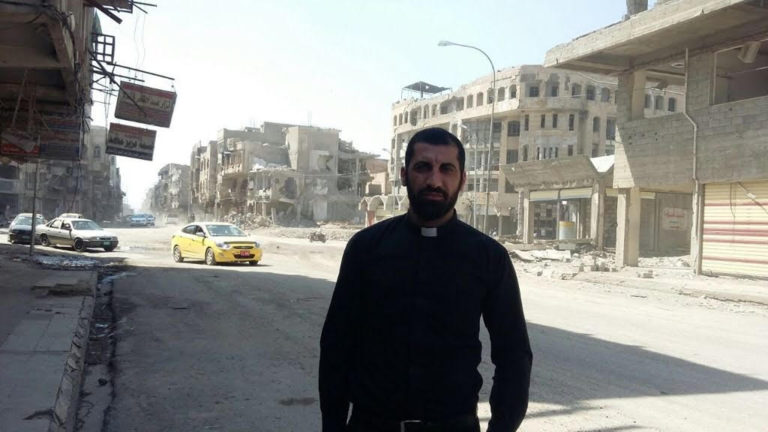
In an interview with Exaudi, Iraqi Syro-Catholic priest, Father Naim Shoshandy, 37, says that Pope Francis’ trip to Iraq will be “a new stage in the country’s history. It will be a visit of peace to give visibility to Christianity and to the dialogue with the faithful of other religions. The Pope will show that Christians exist, he says.
Ordained on September 12, 2013, in the Cathedral of the Immaculate Conception of Qaraqosh, Iraq, this young priest, and his family were obliged to move to Erbil in 2014, given the persecution of the Islamic State, which murdered his 27-year-old brother for being a Christian.
“In these moments of grief and suffering, I realized that God is never far from a person that is suffering. He has always been close to me and my family; God never abandons us,” he stresses.
At present, Father Naim lives in Albacete, Spain, where he is parish priest of Saint Anne’s church and parish Vicar of the church of Our Lady of Anguish and Saint Philip Neri. In addition, he is completing his studies in Valencia and collaborates in a parish of Eastern Christians. He celebrates Mass in Aramaic, Arabic, and Spanish.
In the course of this interview, Father Shoshandy talks about the significance of this papal trip for his country and for the whole of the Middle East, about the situation of Christians in this region, about his personal meeting with Pope Francis, and about his life in Spain.
* * *
Exaudi: The Pope will arrive in Iraq on March 5. What is the general situation the Holy Father will find on his arrival in the country?
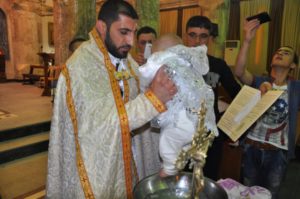
Father Naim: Only a few days are left before the dream of many people in Iraq is realized: Pope Francis’ trip from March 5-8. The situation is complex. However, it will be the first time that a Pope visits Iraq, the land of Abraham, Father of the prophets. Thus, Pope Francis is realizing Pope Saint John Paul II’s dream, who was unable to visit Ur, in the footsteps of Abraham, at the end of 1999. There will be strong security and, in order to control the pandemic, a two-week quarantine has been imposed. Borders between cities are also closed.
Exaudi: What is the significance of this trip for Iraq and for the Christian community in general in the Middle East?
Father Naim: Pope Francis is coming to us, and this means that he supports Christians and peoples of the East who for some time have been living in a state of doubt, fear, and many problems, to support and encourage them, but also with the hope of improving the conditions. This visit is a pilgrimage in which we find a message of brotherhood and fraternity. The last Encyclical, Fratelli Tutti, has meaning not only for Christians but also for all people in these countries: to halt the wars, to halt the conflicts, to halt death, destruction, and corruption.
We must generate trust, peace, stability, and human solidarity. We hope much from the Holy Father. This visit will be a powerful moment for him to reveal the truth. It’s a very courageous act, especially in the difficult times we are all living.
As Christians, in Iraq, Syria Lebanon, and the whole of the Middle East, we have no other way of defending ourselves than with prayer and hope. Our faith is the only thing that gives us strength. In fact, we are a minority in difficulties and we have suffered a lot over the last 20 years in Iraq. However, if we think of Syria and Lebanon . . . it’s a disaster.
Francis will bring a prophetic word that will encourage all and open Iraqi citizens’ eyes and, at the same time, he will bring to neighboring countries a new example of brotherhood, respect, and harmonious coexistence.
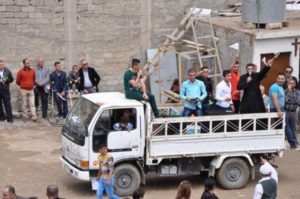
I think His Holiness’ visit will not be only for Iraq, but for the whole of the Middle East, because throughout the region, be they as refugees or still at home, Christians have faced enormous difficulties. I believe the Pope is coming to encourage the Christians of Iraq, Lebanon, and Syria and of the whole of the Middle East to stay in their land to witness their faith and not lose hope. Christians have made a great contribution to Islamic culture. The people of this region are the roots of Christianity and, if Christians leave, our roots will be lost.
Exaudi: What does this visit imply for you, also personally, as an Iraqi priest who has had to abandon his country because of his faith, as representative of persecuted Christians?
Father Naim: For me, Pope Francis is a father who wants to be close to his children. We, Christians, have waited a long time for a Pope’s visit. It’s a visit that fills us with hope and enthusiasm.
It’s the first time that a Pontiff visits my country. It is a point of pride for me that he is going to my city, Qaraqosh. It gives me great hope to know that he will go on the streets where I played as a child, that he will visit the Cathedral of the Immaculate Conception where I was Vicar.
Historically, we Christians of the Middle East, especially of Iraq, have suffered all sorts of persecutions, but we have stayed in our land and we have developed a culture that has served humanity for centuries.
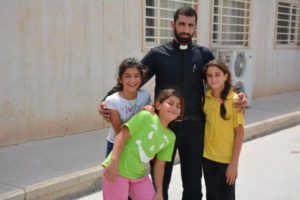
My family and I have lived through very difficult moments, such as my brother’s murder for being a Christian, or our fleeing in 2014 after DAESH’s advent, when we lost everything except our faith. In these moments of grief and suffering, I’ve seen that God is never far from a suffering person. He has always been close to me and to my family; God never abandons us.
Exaudi: In your opinion, how do you think that the rest of the country’s communities will receive Francis’ visit?
Father Naim: The Pope’s presence can help to restore trust between Christians and Muslims. This visit is a pilgrimage in which we find a message of brotherhood and fraternity. Francis will show that Christians exist. He will help, no only to heal the wounds of the country’s lacerated Christian community, but also to stimulate the efforts to restore trust with the Muslim population. This trip will confirm the unity of humanity and it will be a symbol of peace, tolerance and love.
The Holy Father’s visit will shed light again on this history of the land of Iraq, land that once, given its strategic enclave, was the cradle of civilization. This country, which has suffered international isolation, the advent of DAESH, sectarian fights and political conflicts between parties, discredit in international forums and in global opinion, will shine again with His Holiness’ visit.
I believe that Francis’ arrival will be a hymn of hope. I hope it will bring a new culture of coexistence, a new resurrection of the Iraqi people; I hope it will bring us peace, stability, and security. Iraq must return to a new position at the international and local level, and in the Arab world.
Exaudi: What news do you have from Iraq about the preparation for the Pope’s visit?
Father Naim: All are very excited and happy about His Holiness’s visit. It’s a sacred visit for us. The only thing that clouds it is the fear of the coronavirus, but everything possible is being done to guarantee safety. He is a father for all, including the Muslims, who respect him and are happy about his visit. The people wait with excitement to hear Francis.
Exaudi: How is your life in Spain and your remote relation with your nation?
Farther Naim: I came to Spain to complete my studies in Theology on “Marriage and the Family” in Valencia. I collaborate there in a parish of Eastern Catholics and I celebrate Mass in different languages (Aramaic, Arabic, and Spanish).
I carry out my pastoral work in Albacete, where I am parish priest of Saint Anne’s church and parish Vicar of the church of Our Lady of Anguish and Saint Philip Neri in Albacete. At present, I am completing my studies in Valencia and working pastorally in the diocese of Albacete.
Exaudi: Tell us about your personal meeting with Pope Francis in 2019.
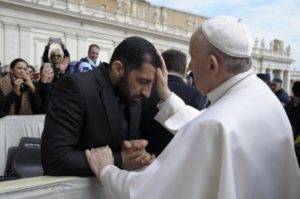
Father Naim: In 2019 I traveled with a group of faithful of the diocese of Albacete as one more pilgrim to Pope Francis’ General Audience held in St. Peter’s Square. I had a profound desire to meet with His Holiness and I went to Rome with that hope to see the one who, with his pastoral gestures, expresses priestly fatherhood.
After due procedures, I was able to get a special place in the Audience, and when the Holy Father ended his catechesis, on taking leave of those of us who were gathered there, what was my surprise and emotion when he came close to where I was; I felt as if he was looking for me to speak with me. In that moment my legs trembled and I could hardly speak, but he, with his affection and patience, took my hands and said to me ”relax my son” and I began to speak.
I introduced myself for what I am, a priest of Iraq and a victim of DAESH. I told him I represented the persecuted Christians of my country. I asked him to pray for all of us and I saw reflected in his eyes his solidarity with all that I said to him, both about my family’s history as well as and especially the suffering we experienced after my brother’s murder.
The strength of the Holy Father’s hand on my hands is something that is imprinted in my memory forever. His vigor is that of a father! In that moment I felt the maternal embrace of the Church for my people and me.
Before blessing me, he promised me that he would pray for all persecuted Christians, especially for those of my country. And I’m certain that his prayer has already been elevated to Heaven.
Every day I thank God for these moments He has given me. The memory of the Pope’s paternal gaze, his humanity, and closeness will be with me for the rest of my life.
Exaudi: What message would you like to give Exaudi’s readers on the situation of Christians in Iraq and, in general, of persecuted Christians?
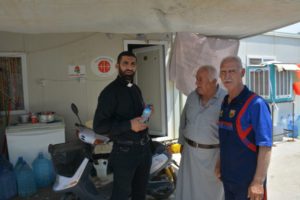
Father Naim: Today we Christians of the Middle East and especially of Iraq only want to live, to profess our faith in freedom, and to build a future for our families and our country. Pope Francis’ trip to Iraq will be a new stage in our country’s history. It will be a visit of peace to give visibility to Christianity and to the dialogue with the faithful of other religions. The Pope will show that Christians exist.
The trip will help to heal, not only the wounds of the country’s lacerated Christian community, but it will also stimulate the efforts to restore trust with the Muslim population. We hope that this visit will bring a different framework, a different horizon to our faithful.
Related

More than a Decade of Service, Reform, and Hope
Exaudi Staff
21 April, 2025
4 min
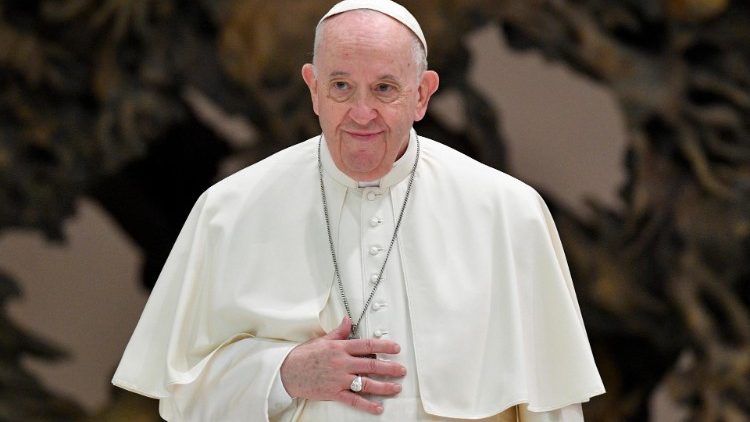
The Pontificate of Pope Francis: A Leadership of Compassion and Renewal for the Church
Exaudi Staff
21 April, 2025
3 min
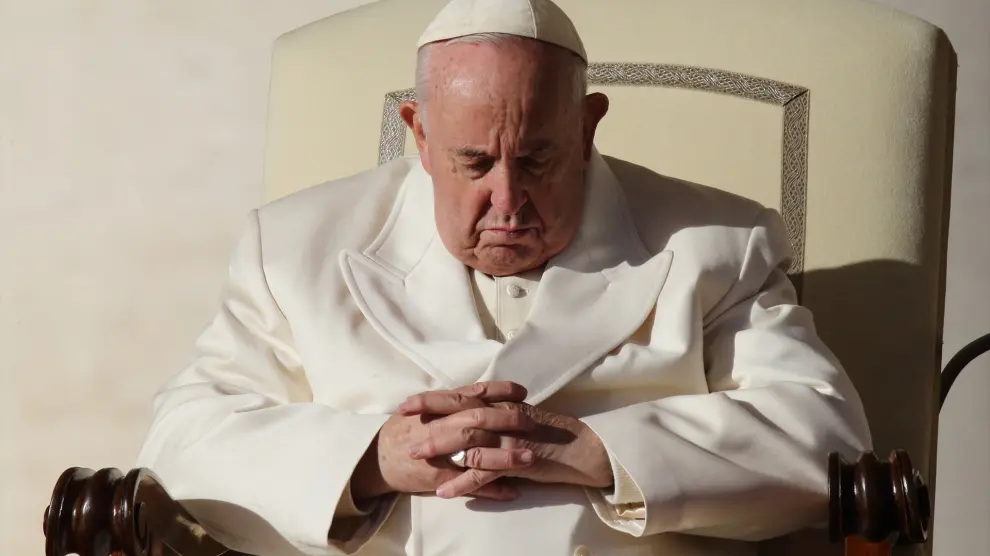
Pope Francis has died
Exaudi Staff
21 April, 2025
2 min
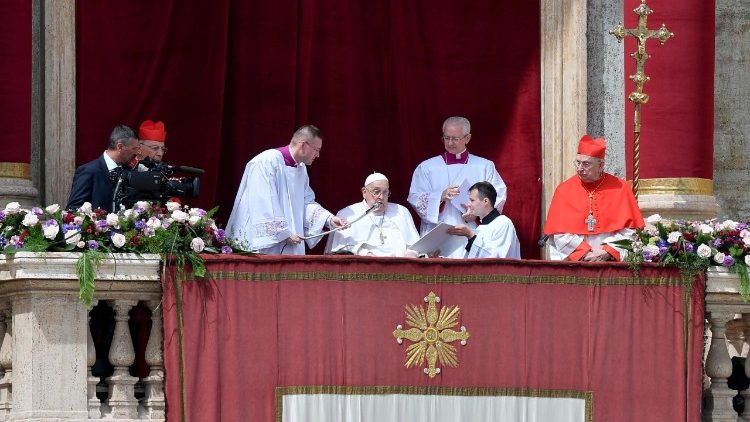
Pope Francis Calls for Global Peace in His Easter Message
Exaudi Staff
20 April, 2025
2 min
 (EN)
(EN)
 (ES)
(ES)
 (IT)
(IT)

